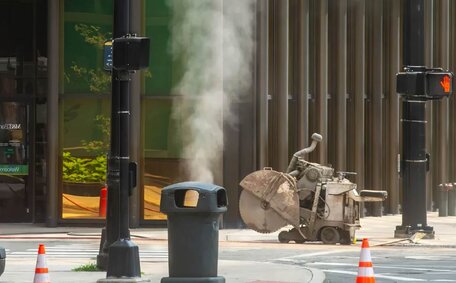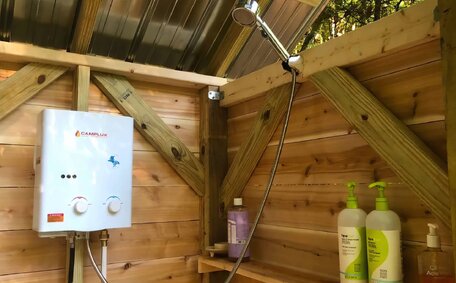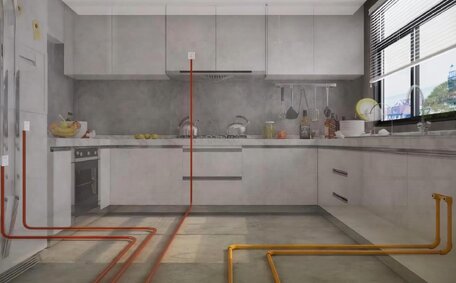
How To Move A Gas Meter
Need your gas meter relocated? You can’t move it yourself - contact your supplier to arrange for a gas engineer to reposition it safely. Charges may apply depending on circumstances.
Read MoreTankless water heaters directly heat water on its way through the unit, eliminating the need for a storage tank.
Turning on your water tap triggers a flow sensor, alerting the system to heat water—courtesy of an electronic control board powering the heating elements. Once activated, the high-performing components ensure water passes through a network of coils within the tankless unit, securing a continuous supply on demand.
Unlike traditional storage tank water heaters that require maintaining a reservoir of hot water, tankless systems heat water only as necessary. By bypassing the need for storage water, they save precious space within your home. Instead, they use modern technology to heat water precisely when needed, without a storage tank.
Tankless units provide an unbroken flow of hot water, satisfying the requirements of an entire household.
Tankless water heaters’ compact design contains advanced components to heat water as needed, without any requirement for storage.
When you turn on a hot water tap, the flow of cold water through the unit prompts the heater to activate, with water quickly heating up as it passes the gas burner or electric element. The sophisticated heating elements not only maximise efficiency but also precisely control water temperature, ensuring a constant on-demand supply.
Our gas hot water systems utilise natural gas or propane burners to heat water instantly, which is energy-efficient. Electric tankless water heaters employ a similar mechanism, using electric coils to quickly heat water without the need for gas flames.
The system’s instant gas burners ignite upon water flow detection, raising water temperature as it travels through the heat exchanger tubes.
Routine maintenance, such as flushing to eliminate mineral buildup, is essential to maintain a tankless heater’s optimal performance. This necessary descaling ensures that the water coursing through unit encounters no deposit-obstructed internal components, preserving optimal flow and heating prowess.
Tankless heaters are designed for optimum efficiency, providing a cost-effective hot water solution far surpassing traditional heaters. A tankless system’s most notable feature is its ability to offer an uninterrupted hot water supply on demand, ensuring you never run out.
Since tankless water heaters can operate by instantly heating the water rather than storing it, they offer substantial energy savings. Homeowners can achieve between 27% to 50% savings on water heating costs when compared with conventional heaters. With lifespans often exceeding 20 years, the long-term savings with tankless systems can be significant.
Another significant advantage of tankless hot water systems is the space-saving design. Their compact design is especially suitable for apartments, condos, and other areas where space is limited.
With advanced components that outlast the traditional hot water tank, hot water heaters can deliver years of reliable performance while reducing energy bills. An instant hot water system simplifies daily routines such as showering and requires less maintenance than traditional tank heaters.
Decision time arrives when you can choose from the water tankless systems, weighing up whether an electric model fits the bill, or if a gas line connected one is more appropriate. Key factors to weigh up include:
In most cases, gas tankless heaters are more energy efficient and cost less to operate than electric models. Running costs for gas electric tankless systems may differ due to local energy prices, so it’s important to compare.
Gas tankless water heaters, which use high-capacity heaters, typically offer higher flow rates, meaning they can deliver hot water to multiple taps simultaneously. Electric units typically cater to the hot water needs of a single tap at any given time.
Gas water heaters need venting to safely expel combustion byproducts outdoors. Electric models don’t need venting which simplifies installation and reduces disruption to your daily routine while being used.
Electric heaters often have a lower upfront cost up, but it’s essential to consider long-term savings from increased gas flow efficiency as well. Nonetheless, lifetime operating expenses for gas systems are generally more economical.
When deciding on a unit, youll need to mull over factors like space constraints, energy usage, and the potential need for new gas lines or electrical upgrades. Consulting with a professional plumber is vital to ensure compliance with all local codes and regulations.
The key factor in sizing is your household’s demand, which is essential to determine the appropriate gallons per minute (GPM) guide:
A precise approach is to add up the GPM for all fixtures potentially in use concurrently, guaranteeing efficient operation of water heaters under simultaneous demand. This guarantees you won’t run out hot water even during times of peak demand.
The groundwater temperature also affects sizing, which is necessary to meet your hot water demand effectively with a tankless unit. Colder inlet water means the heater must work harder to achieve your desired hot water temp. Professional installers like Menai Plumbing factor this in when selecting correctly sized units.
In summary, consulting plumbing experts about the flow rate needs and groundwater temperatures ensures the water heater is precisely sized to meet the water your household requires, so you enjoy endless hot water.
As a general guide:
Technicians will comprehensively evaluate your home to pinpoint the perfect spot for installation, confirming the adequacy of gas lines, electrical systems, and ventilation.
The tankless unit will be securely wall-mounted and connected to water lines, gas or electric power supply, and exhaust vents if a gas model. All connections are made to code standards.
Your technician will activate the system via the hot water tap to assess all functions and safety mechanisms, adjusting the water pressure and temperature settings to suit your household.
Though installation is complex, with expert setup, tankless water heaters provide unmatched efficiency and performance, ensuring a limitless hot water supply.
Routine maintenance is key to extending the efficient operation of your tankless water heater beyond 20 years. Here are some key tips:
Have a professional inspect your heater once a year to ensure all components are functioning properly in your heating system. They can perform any tune-ups needed to optimise performance.
Over time, hard water can cause mineral deposits to accumulate inside the heater. Performing annual descaling, or flushing with a descaling solution, removes such deposits, ensuring unimpeded water flow.
Most tankless heaters feature a sediment filter which, when replaced annually, prevents debris buildup that could restrict flow or heat transfer.
Inspect water and gas connections annually for leaks, which can impact heater efficiency and pose safety risks if left unaddressed. Tighten any loose fittings.
With proper maintenance from gas fitting professionals like Menai Plumbing, your tankless water heater will provide endless hot water for over 20 years.
Need your gas meter relocated? You can’t move it yourself - contact your supplier to arrange for a gas engineer to reposition it safely. Charges may apply depending on circumstances.
Read MoreInvesting in a solar hot water system can save up to 75% on water heating costs. With great returns and added home value, solar hot water can be a smart choice over electric or gas heaters. Contact us to see if it’s the right investment for your home.
Read MoreWhile natural gas and propane can both power appliances in your home, they have notable differences when it comes to BTU output, infrastructure, safety, cost and more. Understanding these key contrasts will help you determine which is better for your specific needs.
Read MoreMenai, 2234 NSW
We will call back as soon as possible.




